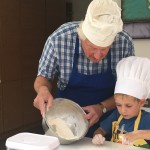Engaging in good conversation is an art and more often than not, conversation is mentioned as a “lost art”. In these days of instant messaging texting and emailing, a conversation is becoming something of a rarity.
When was the last time you enjoyed a face to face exchange of words that was a pleasurable experience rather than being transactional?
When it comes to the art of conversation we’ve all met people who seem to have the knack for it. They can talk to anybody about anything and they seem to do it with easily. Some are that born with the gift of gab, or have kissed the Blarney Stone, but I believe that we can improve our techniques and develop better communication skills.
Conversation is a form of communication; however, it is usually more spontaneous and less formal. We enter conversations for purposes of pleasant engagement in order to meet new people, to find out information and to enjoy social interactions. There are many types of conversation, intellectual dialogues and information exchanges to friendly debate and witty banter.
While there is more to having good conversation skills than being a comedian, dramatic actor, or a great story teller, it is not necessary to become more gregarious, animated, or outgoing.
Instead, you can develop the ability to listen attentively, ask fitting questions, and pay attention to the answers – all qualities essential to the art of conversation. With practice anyone can improve their conversation skills.
Tips on how to improve your conversation skills
Be interested – People who are genuinely interested in others are usually interesting themselves. If you are more open to learning about and understanding new things you will concentrate on what the other person is saying. If you want to share information it is important to be relaxed and listen. Show your attentiveness by keeping good eye contact and responding to their words.
Allow them to talk – a conversation can get boring quickly if one person is doing all the talking while the other is trying to get a word in edgewise. When that happens whoever is not talking begins to tune out – and there is no conversation!
Be interesting and have something to say – while you don’t have to be a humorist, entertainer, or brilliant raconteur, you do need to be interesting. If you are not well informed, tend not to read much, or have very few interests, you will have very little to talk about except yourself. Unfortunately, no one wants to hear about your latest troubles, conquests, or daily routine. Yet so many dull conversationalists believe that’s what people want to hear from them.
Have you ever been stuck with someone at a social event who natters on about their family history, problems with their neighbours, or worst of all their health?
Body language
Observe body language for cues. Is the other person glazing over and therefore bored? Are they moving towards you to speak and you just keep on talking? Are they looking elsewhere (for an escape) while you are carrying on? In a good conversation each person needs to express themselves, or it is no longer a conversation but a monologue.
It is said that 55% of communication is body language, 38% is the tone of voice, and 7% is the actual words spoken. So it is essential that we understand the non-verbal signals being demonstrated in a conversation.
Having something to say
To avoid being that dull person, become knowledgeable about world events, people in the news, or what’s going on locally. Take time to keep up with the latest music, new technological discoveries, or recent best sellers. No one can know everything, so if you can enlighten someone during the course of a conversation, you’ll be a hit. By the same token, you can learn something new as well.
Of course, not all conversations are knowledge sharing gatherings, or discussions of global import. Many, especially at social functions, consist of light-hearted and cheerful banter. In such cases, be aware of the tone and mood of the conversation and go with the flow. If you are not particularly good at one-liners, or much of a joker, you can always listen, smile and enjoy the humour.
Be relaxed and be yourself. If you are anxious, or trying to be someone you’re not, it will show and therefore doom a conversation to failure before it starts. Admittedly, if you are not relaxed it’s hard to appear as if you are. Slow down and take a deep breath or you may end up saying something silly, unintelligible, or unrelated to the conversation. Also smile warmly; it will make you appear pleasant and therefore, more approachable.
One of the greatest pleasures in life is interacting with others and humans were programmed to communicate with each other. We all have something to pass on so listen and learn. Be involved and show the younger generation what fun can be had when they cannot get a signal on their phones!
by Charlotte Courthold




